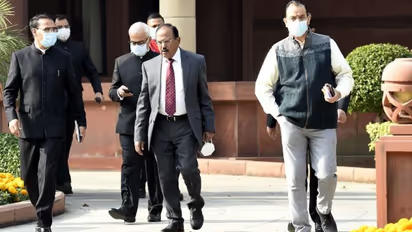Ajit Doval turns 77: Nine moments from the master spy's career

Synopsis
Ajit Doval has wielded more influence than his predecessors because of his experience and credibility.
National Security Advisor Ajit Doval turned 77 today. Widely acknowledged as a master of psychological warfare and nicknamed 'James Bond of India' by others, Doval has been the brain behind the country’s security and military apparatus since 2014.
Prime Minister Narendra Modi trusts him more than anyone else. He is most powerful in the government after the prime minister. As an undercover secret agent, Doval spent seven years in Pakistan's Lahore to gather intelligence. India has so far had five NSAs, including Brajesh Mishra, JN Dixit, MK Narayanan and Shiv Shankar Menon. Ajit Doval has wielded more influence than his predecessors because of his experience and credibility.
On his 77th birthday, let us tell you about some exemplary moments from Ajit Doval's career spanning over 50. Born in 1945 in Uttarakhand’s Pauri Garhwal, he joined the Indian Police Service in 1968. He got the Kerala cadre and his first posting was as Kottayam ASP.
Having spent over a decade in the Intelligence Bureau, he rose to become its director in 2004. In 2005, he retired from services. He had also spent seven years in northeast India.
Mizoram Peace
During the 1980s, the Mizo National Front was one of the most notorious insurgent groups in the northeastern state. With his acumen and skills, he managed to break six out of the seven commanders. This development brought peace and tranquillity to the state.
Operation Black Thunder
During the 1980s, the Khalistani militancy was at its peak in Punjab. Being an active on-ground agent, Doval wanted to infiltrate the militant group. At the time of Operation Black Thunder, Doval had worked as a rickshaw puller in the areas surrounding the Golden Temple. Later, posed as an ISI agent, he befriended the militants who were inside the temple. After earning their faith, he entered the Golden Temple, gathered all information from there and passed them to security agencies. His invaluable intelligence to the forces led to a successful strike being carried out against the militants with minimum casualties to life and property in the temple complex. He was given the Kirti Chakra for his services, a first for any Indian police officer.
Kuka Parray surrender in Jammu & Kashmir
Muhammad Yusuf Parray alias Kuka Parray was a prominent terrorist in Jammu & Kashmir. In the 1990s, Doval went to Kashmir Valley and persuaded him to surrender. Parray had left terror outfit Ikhwan-e-Muslimeen to create his own -- one with an identical name Ikhwan-e-Muslimoon -- in 1995. Since then, he and his supporters started working with the Army and proved extremely helpful in counter-insurgency operations. Parray also contested the assembly election in 1996 and won.
7 years in Pakistan’s Lahore
Ajit Doval spent seven years in disguise while working as an undercover agent in Pakistan. His target was Dawood Ibrahim and Pakistan’s spy agency ISI. He had mastered Urdu and is an expert on Pakistani history, culture and politics.
Negotiating with IC 814 Hijackers
In 1999, terrorists hijacked Indian Airlines IC 814 with 155 passengers and took the aircraft to Kandahar in the Taliban-ruled Afghanistan. It is said that Ajit Doval had negotiated with the hijackers and brought the Indian nationals and aircraft safely. India had to release three dreaded terrorists.
Release of 46 Indian Nurses
In 2014, Doval played a crucial role when 46 Indian nurses were trapped in Iraq's Tikrit Hospital. He ensured their safe release. Doval flew to Iraq as a part of a top-secret mission. He contacted the hierarchy in the Iraqi government and convinced the ISIS terrorists to hand over the nurses safely to the authorities at Erbil City.
Surgical strike in Myanmar
In 2015, Doval and the then Army Chief Gen Dalbir Singh Suhas had planned a cross-border military operation against the National Socialist Council of Nagaland insurgents, operating out in Myanmar. In the operation, the Indian Army troops managed to kill over 35 insurgents. However, the Myanmarese government denied the strikes.
Uri Surgical strike
In 2016, Indian Army troops carried out a surgical strike in Pakistan-occupied Kashmir and inflicted significant casualties on the other side of the Line of Control. The strike was carried out in response to the attack on the Uri military base of the Indian Army in which 19 soldiers were killed. Doval is said to be the architect of this strike.
Balakote strike
In 2019, the Indian Air Force carried out the Balakote airstrike in Pakistan-occupied Kashmir and destroyed the terrorist training camps. The airstrike was conducted in response to the Pulwama terror attack in which 40 CRPF soldiers were killed.
Stay updated with the Breaking News Today and Latest News from across India and around the world. Get real-time updates, in-depth analysis, and comprehensive coverage of India News, World News, Indian Defence News, Kerala News, and Karnataka News. From politics to current affairs, follow every major story as it unfolds. Get real-time updates from IMD on major cities weather forecasts, including Rain alerts, Cyclone warnings, and temperature trends. Download the Asianet News Official App from the Android Play Store and iPhone App Store for accurate and timely news updates anytime, anywhere.